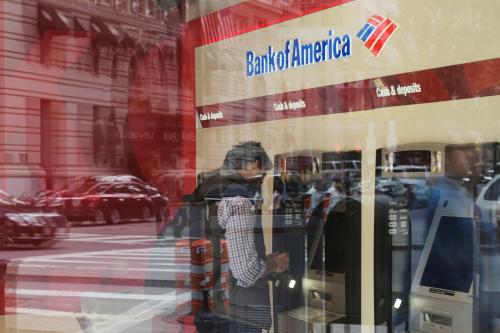This op-ed originally appeared in the Washington Post on May 17, 2019.
When does the interest rate a lender charges cross the line from economically justified to immoral? Societies have struggled with this question since biblical times. Last week, Sen. Bernie Sanders (I-Vt.) and Rep. Alexandria Ocasio-Cortez (D-N.Y.) took a crack at this puzzle, proposing to cap credit card interest rates at 15 percent. They’re concerned that the U.S. credit system traps working families with unsustainable debt. We share their concern, but their proposal uses a blunt instrument to attack a nuanced problem.
The Loan Shark Prevention Act, as the new legislation is called, is likely to hurt the people it’s designed to help, driving the market away from consumers with low credit scores. Some people may have their interest rates reduced, but many would no longer have access to credit at any price. Banks have been clever in figuring out how to hide credit in fees, as anyone who has paid $35 for an overdraft knows.
To make affordable credit accessible to a broader group, let’s fix the flawed scoring system that allocates credit.
Our current system decides who gets credit and at what price using algorithms that analyze a person’s credit history and calculate a credit score. FICO, the most common credit score, employs a range between 300 and 850. There is no universally accepted definition of what constitutes a prime or subprime credit score but, generally, people with scores above about 680 are rewarded with cheap credit and high borrowing limits. Those classified as either near-prime or subprime, whose scores largely fall below 680, have a tougher time accessing and paying for credit.
The apparent objectivity of the algorithm masks a whole host of issues. A peek behind the credit-scoring curtain reveals that, as in “The Wizard of Oz,” there are humans feeding imperfect information into the machine. You could be the most creditworthy person on the planet, but if you lack a credit history, are a young adult or a recent immigrant, or had financial hardship in the past five years, your score will be low. Credit reports are rife with errors: One out of 5 Americans has a material error on their score. Inequity is baked into a system that takes a narrow view of creditworthiness.
Congress should start examining this system and aggressively pushing for its improvement. Lawmakers should push for credit-scoring formulas that take a wider range of data into consideration. Paying a mortgage on time improves your credit score, but paying your rent on time does not, because mortgages are tracked and rents generally are not. That’s just not fair.
Credit scores rely heavily on the number of years a person has been in the system, which discriminates against youth and recent immigrants. Your credit history does not migrate with you. To help those who aren’t born into privilege have a fair shake in our society, we need systems that help them build credit.
The Consumer Financial Protection Bureau estimates that 45 million Americans lack the data that credit bureaus use to create a credit score. If you don’t have a score, it can be very hard to get a loan, rent an apartment or persuade an employer to hire you. Credit scores have become an essential component of what Princeton sociologist Frederick Wherry calls “financial citizenship” — the ingredients necessary to participate fully in the economy and civil society.
Credit scoring is a relatively recent phenomenon. FICO debuted its first general-purpose score in 1989, as computing power and data collection made it possible. It is time to advance again. New computing tools allow leaders to use broader information. Alternatives such as cash-flow underwriting eschew credit history altogether and focus on how much money a person regularly has available.
To be sure, allocating credit is tricky and government plays an important role. Using alternative data raises privacy issues and could make credit decisions less transparent for consumers. Data is often correlated with race, ethnicity, gender and other protected classes. Credit remains a tool of discrimination that denies opportunity to broad groups of people in our society for unfair reasons.
Capping credit card interest rates at 15 percent will eliminate many bad actors, but it will also provide fewer opportunities for those who are cut out of the system to get inside. There are better solutions to the problems payday lenders pose, such as the CFPB’s original payday lending rule, which would have required lenders to make sure borrowers had the means to repay loans. The problems run deeper than the nominal rate offered. America’s credit allocation system needs a reset.
The CFPB began to investigate the pluses and minuses of using alternative data, issuing a request for information and granting its first no-action letter to Upstart Network, a company that uses nontraditional data to make lending decisions. That was before the Trump administration set out to neuter the bureau, which included gutting the payday lending rule.
Absent a strong push from Congress, the core system is unlikely to change. That’s why we agree with the spirit behind the new legislation — that all Americans have a right to safe and affordable financial services. We disagree, however, about how best to change a system that works for the well-heeled and leaves too many Americans under the boot of expensive debt.








Commentary
Op-edTo reform the credit card industry, start with credit scores
May 20, 2019